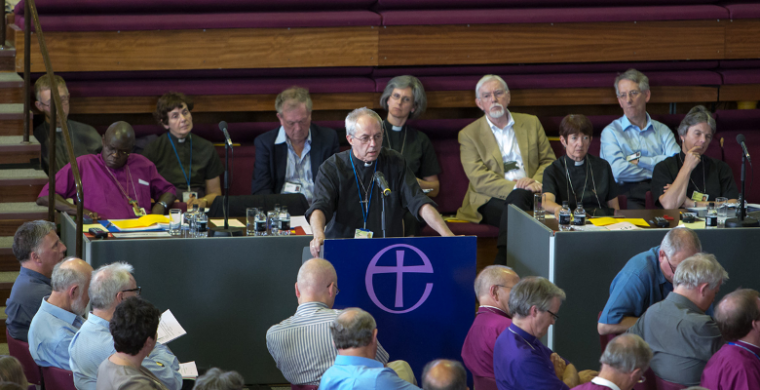Archbishop Welby says Anglican Communion is flourishing but Acknowledges Divisions and Threats
Our divisions may be too much to manage, says ABC. Serious fractures possible
No Primates meeting. Lambeth Conference still a possibility though '08 ruled out
By David W. Virtue DD
www.virtueonline.org
Nov. 17, 2014
The good news is that the Communion exists and is doing wonderful things. The bad news is there are great divisions and threats, noted Archbishop of Canterbury Justin Welby in his presidential address to the Church of England Synod today.
The archbishop said any talk that the Communion had, for all practical purposes ceased to exist, is not true. "Not only does it exist, the question is what it will look like in the future. That may be very different."
Addressing issues facing the Anglican Communion and possible ways forward, Welby acknowledged "incredible diversity", which, he said, includes sexuality, marriage and its nature, the use of money, the relations between men and women, the environment, war and peace, distribution of wealth and food, and a million other things.
Welby acknowledged that diversity is "both gift and challenge to be accepted and embraced. The prize is visible unity in Christ despite functional diversity."
He warned his listeners not to oversimplify the complex and diverse nature of human existence for no better reason than we cannot manage difference and dealing with the Other. "Yet in Christ we are held together. In Christ the barriers are broken, peace is held out to us as a gift established, which needs living.
"We live in a community that exists, that is deeply engaged with its world almost everywhere that is diverse and argumentative and fractured. He acknowledged the Communion is "divided." He called for repentance.
"There are enormous problems. We have deep divisions in many areas, not only sexuality. There are areas of corruption, other areas where the power of the surrounding culture seems to overwhelm almost everyone at one point or another."
Welby believes the divisions may be too much to manage. "In many parts of the Communion there is a belief that opponents are either faithless to the tradition, or by contrast that they are cruel, judgmental, inhuman. I have to say that we are in a state so delicate that without prayer and repentance, it is hard to see how we can avoid some serious fractures."
The archbishop noted that the Communion is under threat from both poverty and persecution. "There is persecution in the Communion, in many, many areas. We are a poor, and a persecuted Church," he added, citing African the Middle East and South East Asia as arenas of persecution; he also condemned Jihadist attacks which have killed Anglicans, other Christians and fellow Muslims. He called it "a Black Death" and described its spread in three Dioceses of West Africa as "catastrophe of historic proportions."
"Where do we go? There are no strategies and no plans beyond prayer and obedience. It comes with prayer, and us growing closer to God in Jesus Christ and nothing else is an effective substitute."
The future of the Communion requires sacrifice, he observed.
Perhaps with an eye on the Episcopal Church and the growing Anglican Church in North America, Welby opined that the biggest sacrifice is that we cannot only work with those we like, but we must also hang out with those whose views are different from ours. "Groups of like-minded individuals meeting to support and encourage each other may be necessary, but they are never sufficient. Sufficiency is in loving those with whom we disagree. What may be necessary in the way of party politics, is not sufficient in what might be called the polity of the Church."
Stressing his constant themes of unity and reconciliation, the archbishop said groups within the Church of England must not seek to prevail with their own particular views, but speak the truth in love.
On the future of the Communion, Welby observed that he has not called a Primates' Meeting because he feels it is necessary for the Anglican Communion to develop a collegial model of leadership. "If the majority view of the Primates is that such a meeting would be a good thing, one will be called in response." He noted that the "agenda for that meeting will not be set centrally, but from around the Primates of the Communion."
Welby said the Primates' meeting (if one is called) is to decide if there will be another Lambeth Conference. "It is certainly achievable, but the decision is better made together carefully, than in haste to meet an artificial deadline of a year ending in 8. A Lambeth Conference is so expensive and so complex that we have to be sure that it is worthwhile. It will not be imposed, but part of a collective decision."
Welby called into question the validity of the Instruments of Communion saying that in the 21st century -- a post-colonial world - with the majority of its members in the Global South, the role of the Instruments of Communion, especially the Archbishop of Canterbury, are now in question. Whatever the answer, it is likely to be very different from the past.
END














